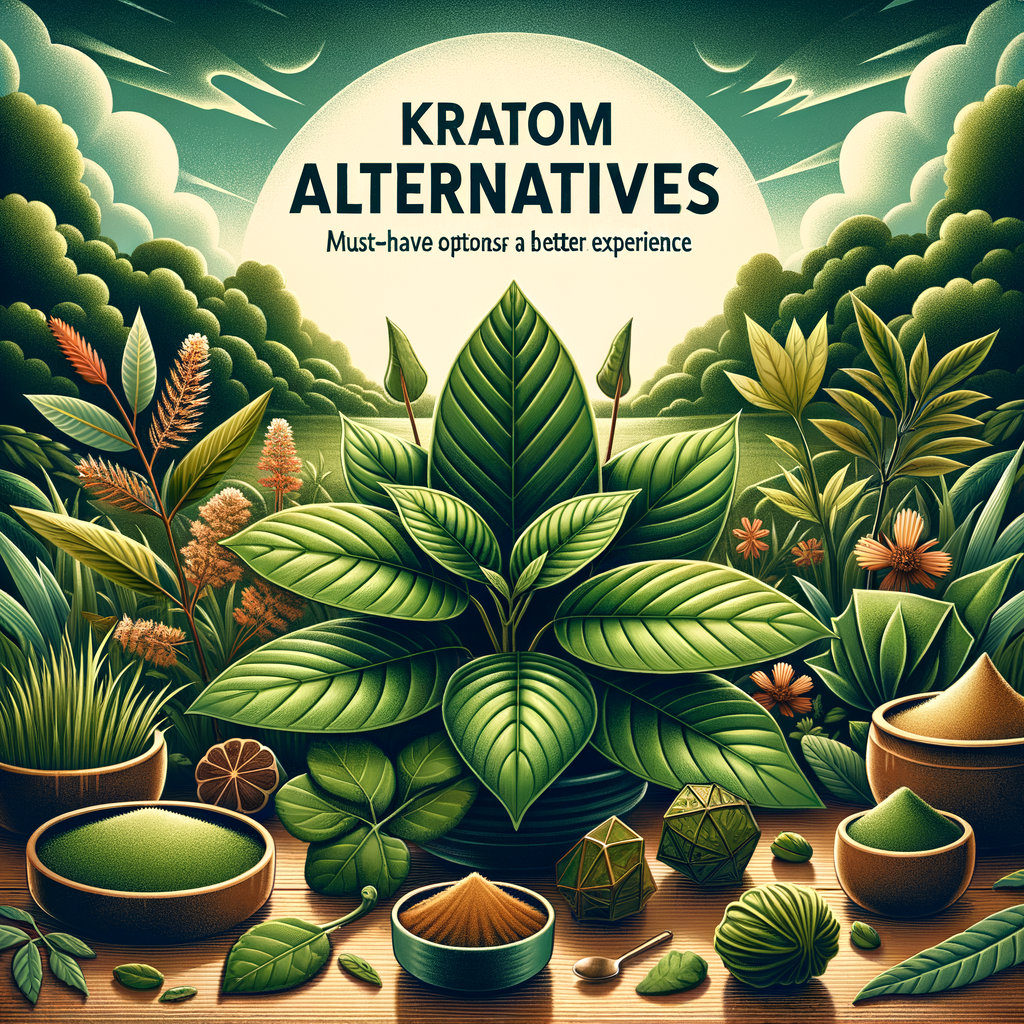
Kratom Alternatives: Must-Have Options for a Better Experience
- Understanding the Need for Kratom Alternatives
- Herbal Alternatives to Kratom
- 1. Green Tea
- 2. Turmeric
- 3. Passionflower
- Natural Supplements for Kratom Alternatives
- 1. CBD Oil
- 2. Ashwagandha
- 3. Rhodiola Rosea
- Lifestyle Changes to Enhance Wellness
- 1. Regular Exercise
- 2. Mindfulness Meditation
- 3. Healthy Diet
- Combining Alternatives for Optimal Results
- Blending Supplements
- Creating a Daily Routine
- Evaluating Your Progress
- FAQs
- 1. Are kratom alternatives safer than kratom?
- 2. How long does it take for these alternatives to work?
- 3. Can I combine these alternatives?
- 4. What are the side effects of these alternatives?
- 5. Is kratom illegal everywhere?
- 6. Can I use these alternatives if I’m on medication?
- 7. How do I choose the best alternative for me?
- 8. Are there any dietary restrictions for using these alternatives?
- 9. Can I find these alternatives in stores?
- 10. How do I know if an alternative is quality?
- Conclusion
- References
Understanding the Need for Kratom Alternatives

In recent years, kratom has gained significant attention for its potential benefits. People seek kratom for various reasons, including pain relief, anxiety reduction, and even mood enhancement. However, some individuals experience unwanted side effects or find that kratom doesn’t work for them. This leads many to explore alternatives that might provide similar benefits without the drawbacks.
Kratom alternatives come in various forms, including herbal supplements, natural remedies, and lifestyle changes. This article aims to explore these alternatives in depth, helping you find options that suit your needs. Whether you’re looking for something herbal, plant-based, or lifestyle-oriented, you’ll discover various pathways to enhance your well-being.
Herbal Alternatives to Kratom
1. Green Tea
Green tea is more than just a popular beverage. It has compounds like L-theanine, which promote relaxation and mental clarity. This makes green tea an excellent alternative for those seeking to alleviate anxiety.
Drinking green tea can offer a gentle boost in energy without the jitters often associated with caffeine. It also contains antioxidants that contribute to overall health and wellness. You can enjoy it hot or cold, making it a versatile choice.
2. Turmeric
Turmeric, often highlighted for its anti-inflammatory properties, is another potential substitute. Curcumin, the active ingredient in turmeric, is known for its pain-relief properties. Many people use turmeric to manage chronic pain or inflammation, making it an effective kratom alternative.
You can take turmeric in various forms, such as capsules, teas, or even added to your meals. This spice not only enhances flavors but also boosts your health.
3. Passionflower
Passionflower has been used for centuries as a natural remedy for anxiety and sleep issues. Studies suggest that it may have calming effects, similar to a mild sedative. If you’re looking for something to help you unwind at the end of the day, passionflower can be an excellent choice.
You can find passionflower in teas, capsules, or tinctures. It’s important to consult with a healthcare provider before trying new supplements, especially if you’re on medication.
Natural Supplements for Kratom Alternatives
1. CBD Oil
CBD oil has surged in popularity and for good reason. This non-psychoactive compound from cannabis offers many potential health benefits without the “high.” Users often report reduced anxiety and improved sleep quality.
CBD oil is available in various forms, from tinctures to edibles. Additionally, it pairs well with other natural supplements, enhancing its effectiveness. Always check the legality of CBD products in your area before purchasing.
2. Ashwagandha
Ashwagandha is an adaptogen that helps your body manage stress. This ancient herb has been shown to reduce cortisol levels while enhancing overall well-being. Many people find that ashwagandha aids in relaxation and boosts their mood.
You can take ashwagandha in capsule form or as a powder mixed into smoothies or teas. Consistency is key, so include it in your daily routine for optimal results.
3. Rhodiola Rosea
Rhodiola Rosea is known for its potential to enhance energy and combat fatigue. This adaptogen can help improve concentration, making it an excellent choice for busy lifestyles. Many people turn to it during stressful times or when facing demanding tasks.
Available in capsules or teas, Rhodiola can be a simple addition to your wellness toolkit. As always, consult a healthcare professional to discuss potential interactions with other medications.
Lifestyle Changes to Enhance Wellness
1. Regular Exercise
Incorporating physical activity into your routine can significantly impact your mood and overall well-being. Exercise releases endorphins, which are natural mood lifters. Regular movement can also help alleviate pain and improve your cognitive functions.
Consider activities you enjoy, such as walking, yoga, or dancing. Making exercise a habit boosts your mental health and enhances your physical condition.
2. Mindfulness Meditation
Practicing mindfulness meditation can drastically improve your mental health. In today’s fast-paced world, taking time to be present helps reduce stress and anxiety. Setting aside even ten minutes a day can make a significant difference.
You can find many guided meditations online, making it easy to get started. This simple practice fosters mental clarity, calmness, and emotional balance.
3. Healthy Diet
A balanced diet fuels both your body and mind. Consuming whole, nutrient-dense foods supports mood stability and energy levels. Foods rich in omega-3 fatty acids, antioxidants, and vitamins contribute to mental well-being.
Focus on including fresh fruits, vegetables, lean proteins, and whole grains in your diet. Limit processed foods and sugars that can lead to energy crashes and mood swings.
Combining Alternatives for Optimal Results
Finding the perfect kratom alternative may require a combination of strategies. You can mix herbs with lifestyle changes to achieve more effective results. Here are some ways to create a holistic approach to your wellness.
Blending Supplements
Consider pairing herbal supplements like ashwagandha with mindfulness practices. This combination can help you reduce stress while enhancing your focus. Likewise, combining CBD oil with regular exercise can amplify its effects on mood and anxiety.
Creating a Daily Routine
Establish a daily routine that incorporates your chosen alternatives. For instance, you might start the day with a cup of green tea, include a healthy breakfast, and practice mindfulness meditation. Throughout the day, you can fit in yoga sessions or walks to keep your energy levels high.
Evaluating Your Progress
Keep track of your journey and evaluate how your chosen alternatives impact your well-being. You can maintain a journal to record your feelings and observations. This practice can help you adjust your routine and make informed choices.
FAQs
1. Are kratom alternatives safer than kratom?
Many people consider herbal and natural alternatives safer than kratom, especially if they experience side effects from kratom. However, individual responses vary, so it’s essential to consult a healthcare professional.
2. How long does it take for these alternatives to work?
The time it takes to experience benefits depends on the specific alternative and individual metabolism. Some might notice effects within a few hours, while others may require consistent use over several days or weeks.
3. Can I combine these alternatives?
Yes, combining some of these alternatives can enhance their effects. However, it’s best to consult a healthcare professional to ensure safety and compatibility.
4. What are the side effects of these alternatives?
While many natural supplements have few side effects, they can still interact with medications or cause mild reactions like digestive upset. Always read product labels and consult with a healthcare provider.
5. Is kratom illegal everywhere?
Kratom legality varies by region and country. Some places have banned its use, while others allow it. Check local laws before purchasing or using kratom.
6. Can I use these alternatives if I’m on medication?
Always consult your healthcare provider before introducing new supplements, especially if you’re on medication. Some natural remedies can interact with pharmaceuticals.
7. How do I choose the best alternative for me?
Choosing the best alternative depends on your needs and preferences. Consider your health goals, consult with healthcare professionals, and research to find what resonates with you.
8. Are there any dietary restrictions for using these alternatives?
Generally, there are no strict dietary restrictions with most herbal alternatives. However, it’s a good idea to maintain a balanced diet for optimal health benefits.
9. Can I find these alternatives in stores?
Yes, many of these supplements are widely available in health food stores, pharmacies, or online marketplaces.
10. How do I know if an alternative is quality?
Look for third-party testing, customer reviews, and certifications when choosing supplements. Quality assurance can help ensure you’re getting what you pay for.
Conclusion
Exploring kratom alternatives can open up a world of possibilities for enhancing your well-being. Whether you opt for herbal supplements, lifestyle changes, or a combination, numerous options exist.
By taking a holistic approach to your health, you can find what works best for you. Take the time to experiment and discover the alternatives that fit into your life seamlessly.
References
1. National Center for Complementary and Integrative Health. (n.d.). Kratom
2. Harvard Health Publishing. (n.d.). The Benefits of Green Tea
3. Mayo Clinic. (2020). Turmeric: A Natural Anti-Inflammatory
4. Project CBD. (2021). CBD Basics
5. Medical News Today. (2022). Ashwagandha: Benefits, Dosage, and Side Effects
By understanding these alternatives and implementing them into your daily routine, you can enhance your overall experience and well-being.


